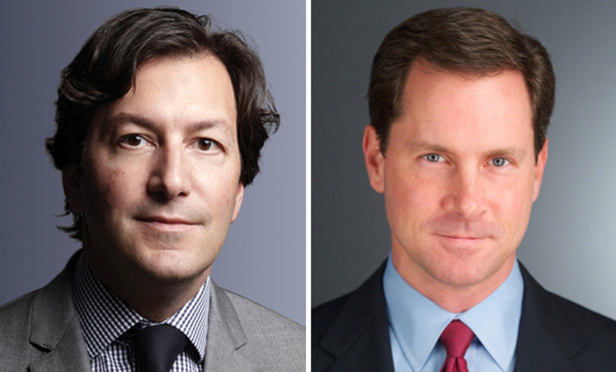Christopher Boehning

June 02, 2015 | New York Law Journal
Third-Party Subpoena Extended to Overseas AffiliatesIn their Federal E-Discovery column, H. Christopher Boehning and Daniel J. Toal write: A recent federal court decision should serve as a wake-up call to companies that find themselves on the receiving end of a subpoena, as courts may very well hold them to the same standard as parties and require prompt and complete compliance with such subpoenas.
By H. Christopher Boehning and Daniel J. Toal
10 minute read

June 01, 2015 | New York Law Journal
Third-Party Subpoena Extended to Overseas AffiliatesIn their Federal E-Discovery column, H. Christopher Boehning and Daniel J. Toal write: A recent federal court decision should serve as a wake-up call to companies that find themselves on the receiving end of a subpoena, as courts may very well hold them to the same standard as parties and require prompt and complete compliance with such subpoenas.
By H. Christopher Boehning and Daniel J. Toal
10 minute read

April 07, 2015 | New York Law Journal
Court Opens Dangerous Door to Compulsory 'Quick Peek'In their Federal E-Discovery column, H. Christopher Boehning and Daniel J. Toal of Paul, Weiss, Rifkind, Wharton & Garrison discuss "quick peek" agreements, which can speed up discovery because parties can reduce the amount of privilege review they conduct before a production, knowing that any privileged documents disclosed will be returned to the producing party without objection.
By H. Christopher Boehning and Daniel J. Toal
12 minute read

April 06, 2015 | New York Law Journal
Court Opens Dangerous Door to Compulsory 'Quick Peek'In their Federal E-Discovery column, H. Christopher Boehning and Daniel J. Toal of Paul, Weiss, Rifkind, Wharton & Garrison discuss "quick peek" agreements, which can speed up discovery because parties can reduce the amount of privilege review they conduct before a production, knowing that any privileged documents disclosed will be returned to the producing party without objection.
By H. Christopher Boehning and Daniel J. Toal
12 minute read

February 03, 2015 | New York Law Journal
Meta-Discovery Denied: Decision Limits Scrutiny of MethodsH. Christopher Boehning and Daniel J. Toal of Paul, Weiss, Rifkind, Wharton & Garrison discuss 'Freedman v. Weatherford International', which involved a party seeking discovery of materials meant to test the sufficiency of the discovery methods used by a responding party.
By H. Christopher Boehning and Daniel J. Toal
11 minute read

February 03, 2015 | New York Law Journal
Meta-Discovery Denied: Decision Limits Scrutiny of MethodsH. Christopher Boehning and Daniel J. Toal of Paul, Weiss, Rifkind, Wharton & Garrison discuss 'Freedman v. Weatherford International', which involved a party seeking discovery of materials meant to test the sufficiency of the discovery methods used by a responding party.
By H. Christopher Boehning and Daniel J. Toal
11 minute read

December 02, 2014 | New York Law Journal
Proportionality: Rarely Used, Primed for a Return?In their Federal E-Discovery column, H. Christopher Boehning and Daniel J. Toal discuss a rare written decision limiting discovery under the proportionality rule set forth in Fed. R. Civ. P. 26(b)(2)(C)(iii) and proposed amendments that involve moving the proportionality rule up from its current position in 26(b)(2) to 26(b)(1).
By H. Christopher Boehning and Daniel J. Toal
11 minute read

October 07, 2014 | New York Law Journal
Microsoft Paves the Way for Data Privacy BattleIn their Federal E-Discovery column, H. Christopher Boehning and Daniel J. Toal of Paul, Weiss, Rifkind, Wharton & Garrison write: Microsoft Corporation has found itself at the center of an intense legal battle regarding the ability of the United States government to subpoena data stored abroad. In addition to drawing the attention of constitutional law scholars, technology companies, and lawmakers, the case has also implicated some emerging areas of e-discovery practice.
By H. Christopher Boehning and Daniel J. Toal
13 minute read

August 05, 2014 | New York Law Journal
Court Praises Predictive Coding, But Ultimately Rejects ItIn their Federal E-Discovery column, H. Christopher Boehning and Daniel J. Toal, litigation partners at Paul, Weiss, Rifkind, Wharton & Garrison, discuss 'Progressive Casualty Ins. v. Delaney', in which the court sheds light on the reasons why parties have been reluctant to accept predictive coding and highlights a key debate over best practices.
By H. Christopher Boehning and Daniel J. Toal
9 minute read

June 03, 2014 | New York Law Journal
New Rule 37(e) Overrules Second Circuit on Sanctions for Loss of ESIIn their Federal E-Discovery column, H. Christopher Boehning and Daniel J. Toal, litigation partners at Paul, Weiss, Rifkind, Wharton & Garrison, write: A new e-discovery rule leaves judges with a great deal of discretion in terms of imposing curative measures and requiring exceptional efforts to retrieve less accessible information. Therefore, much remains to be seen in terms of how this new Rule plays out.
By H. Christopher Boehning and Daniel J. Toal
11 minute read
Trending Stories
- 1Call for Nominations: Elite Trial Lawyers 2025
- 2Senate Judiciary Dems Release Report on Supreme Court Ethics
- 3Senate Confirms Last 2 of Biden's California Judicial Nominees
- 4Morrison & Foerster Doles Out Year-End and Special Bonuses, Raises Base Compensation for Associates
- 5Tom Girardi to Surrender to Federal Authorities on Jan. 7
More from ALM
- Scan In Progress: Litigators Leverage AI to Screen Prospective Jurors 1 minute read
- Legal Speak at General Counsel Conference East 2024: Match Group's Katie Dugan & Herrick's Carol Goodman 1 minute read
- Legal Speak at General Counsel Conference East 2024: Eric Wall, Executive VP, Syllo 1 minute read



